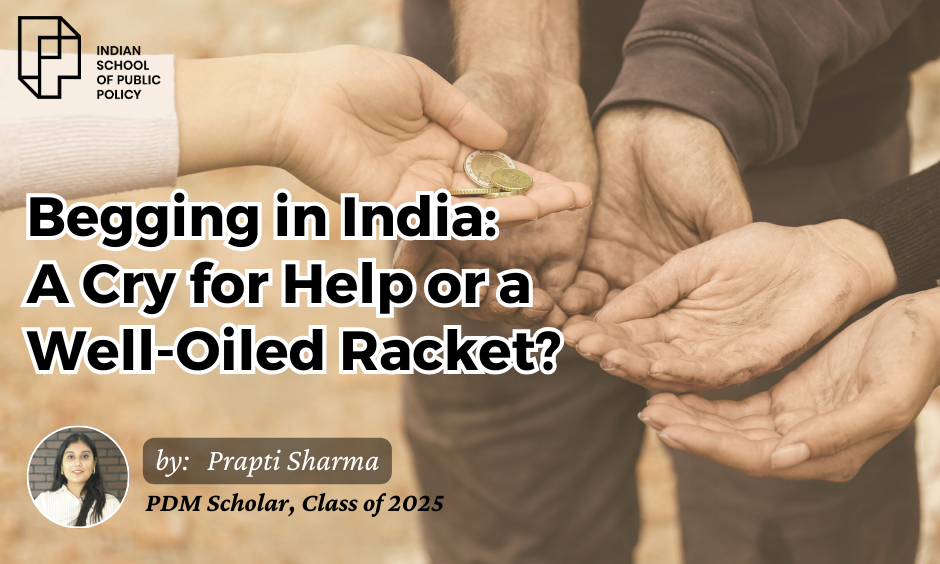
Begging in India: A Cry for Help or a Well-Oiled Racket?

Begging, once rooted in religious charity, has morphed into a complex socio-economic issue in India. While the outstretched hand on a bustling street may seem like a plea for survival, it often conceals a web of exploitation, organized cartels, and systemic neglect. From infants drugged for sympathy to children pulled out of school and thrust into the streets, begging isn’t just a cry for help—it’s an indictment of our collective failure.
The Scale of Begging: A Global and Domestic Perspective
India is home to over 400,000 regular beggars, with reasons for their plight ranging from poverty, disabilities, and displacement caused by natural calamities to exploitation by organized begging rings (Census,2011). These syndicates have turned destitution into a lucrative business, preying on society’s most vulnerable and operating with near impunity.
West Bengal leads among Indian states, with over 81,000 individuals engaged in begging, followed by Uttar Pradesh and Andhra Pradesh. The high concentration of beggars in these regions reflects a mix of socio-economic factors, including poverty, rural-urban migration, and a lack of accessible support systems.
On the global front, Nigeria is frequently cited as having one of the largest populations of beggars. Factors such as poverty, political instability, and displacement due to conflicts and natural disasters have contributed to this crisis, making begging a visible issue on its streets.
Key Realities:
- Organized Cartels: Begging syndicates operate with defined zones, collecting daily earnings from individuals they control. Violence and coercion are often used to maintain these operations.
- Child Exploitation: Children involved in begging are the most vulnerable. Many are school dropouts or have never been enrolled, which robs them of any hope for a better future. Infants are frequently drugged to appear sickly, while children are either rented or kidnapped to increase profits.
These organized systems not only perpetuate cycles of poverty but also contribute to a lack of education and opportunities for children, leaving them trapped in a life of destitution.
Begging as a Business: Laziness or Survival?
While poverty remains the primary driver of begging, it is not the sole factor. Sociological studies indicate that psychological factors, such as lethargy and aversion to labour (International Journal of Humanities and Social Science Research), also contribute to some individuals choosing to beg. Critics argue that public almsgiving sustains this cycle, creating dependency rather than empowerment.
For Instance Bharat Jain: Recognized as the world’s richest beggar, operates in Mumbai, India. He reportedly earns about ₹2,500 ($30) daily and has accumulated a net worth of approximately ₹7.5 crore ($890,000). Jain owns a luxurious two-bedroom flat and rents out two shops, generating additional monthly income(New York Post).
The Indore Example: A Bold Step Forward
Indore, often celebrated as India’s cleanest city, has taken a pioneering approach by announcing a ban on almsgiving effective January 1, 2025.
- Legal Measures: Residents giving alms to beggars face fines or FIRs. The city hopes to deter public donations, a key enabler of begging cartels.
- Awareness Drives: Throughout December 2024, the administration has educated citizens on the harmful effects of street begging, urging them to support rehabilitation centres instead.
- Rehabilitation Efforts: Beggars are being relocated to shelters under the SMILE scheme, where they receive counselling, healthcare, and vocational training.
Indore’s initiative seeks to disrupt organized begging while providing sustainable alternatives for those in genuine need.
Rajasthan’s Skill-Building Programs for Homeless, PwDs, and Beggars
Rajasthan, through its Project Bhor and Rehabilitation of Beggars Act 2012, has been taking some constructive steps in dealing with the problem of begging, as opposed to the harsh ban on begging that was launched in Indore. These initiatives promote skills enhancement, vocational activities, and social inclusion of beggars, the homeless and the disabled, thus emphasizing empowerment rather than punishment. The Rajasthan model reiterates the need to look at the issue of begging by first addressing the underlying issues through holistic development.
⮞Project BHOR (Bhikshook Orientation and Rehabilitation):
- Vocational training programs under the Rajasthan Skill and Livelihood Development Corporation (RSLDC).
- Training in cooking, tailoring, plumbing, electrical work, and security services.
- Graduates have secured jobs in organizations like Akshaya Patra and Fortis Hospital.
⮞Rajasthan Rehabilitation of Beggars Act, 2012:
- Focuses on rehabilitation over punishment for begging.
- Establishes rehabilitation homes offering skill-building and social integration support.
⮞Homeless Upliftment and Rehabilitation Policy, 2022:
- Targets homeless individuals, nomadic tribes, and PWDs.
- Ensures access to welfare schemes, legal rights, and skill training for reintegration.
India’s Antiquated Legal Framework
India’s primary anti-begging law, the Bombay Prevention of Begging Act, 1959, criminalizes begging with imprisonment and fines. Critics argue that the law is punitive, targeting symptoms rather than addressing root causes like poverty and unemployment.
In 2018, the Delhi High Court declared several provisions unconstitutional, citing violations of Articles 14 (equality) and 21 (right to life). The court emphasized that punishing individuals for begging, often their only means of survival, was unjust without systemic solutions.
The Shadow Economy of Begging
Begging rings in cities like Mumbai and Delhi have turned human suffering into profit. These syndicates prey on society’s most vulnerable, operating with impunity:
1. Infants and Children:
Infants are drugged to appear unwell, while older children are trained to beg. Many are school dropouts, while others have never seen a classroom, sacrificing their future for immediate earnings. Recent data highlights the persistent issue of school dropouts in India, particularly among adolescents. The Annual Status of Education Report (ASER) 2023 reveals that 32.6% of 18-year-olds have discontinued their education, with 25% struggling with basic reading skills (Shiksha, 2024).
2. Disabled and Mentally Ill Individuals:
People with disabilities are exploited as they evoke greater sympathy. Mental health issues are left untreated, trapping individuals in cycles of dependency and exploitation.
Global Perspectives: Tackling Begging Worldwide
Internationally, countries have adopted varied strategies to address begging, balancing enforcement with rehabilitation:
- United Arab Emirates (UAE): The UAE enforces strict penalties for begging, including fines and imprisonment, complemented by public campaigns that encourage donations to licensed charities (U.AE, n.d.).
- Denmark: Denmark has implemented laws against all types of begging, aiming to dismantle organized rings; however, these measures have faced criticism for potentially impacting marginalized groups (European Parliament, 2017).
- Sweden: Sweden enforces anti-begging laws while providing robust welfare support, offering a balanced approach.
- Luxembourg: Luxembourg City’s ban on begging, intended to curb organized exploitation, has sparked debates regarding its humanitarian implications (Euronews, 2024).
These international perspectives underscore the complexity of addressing begging, highlighting the need for policies that consider both enforcement and the provision of social support to vulnerable populations.
A Way Forward: Dismantling the System
Addressing the complex issue of begging in India requires systemic changes and collaborative efforts. Below is an overview of actionable strategies supported by examples of organizations actively working toward eradicating this problem:
1. Centralized Rehabilitation Framework
Creating centralized shelters and rehabilitation programs is crucial to providing sustainable alternatives for beggars.
- Fulora Foundation’s Beggars Free Mission: This initiative focuses on the complete rehabilitation of beggars by providing them with training, identity, and avenues for self-employment (Fulora Foundation, n.d.).
2. Focused Support for Children
Child begging remains one of the most disturbing aspects of this issue. Protecting and educating these children is essential to breaking the cycle.
- Leher: Leher collaborates with organizations like Prerana to rescue children from streets, offering rehabilitation programs and reintegration into mainstream society (Leher, n.d.).
- UNICEF India: UNICEF works to prevent child exploitation, including child labour and begging, by ensuring access to education and providing legal and social support systems (UNICEF India, n.d.).
3. Dismantling Begging Syndicates
Organized begging cartels exploit the vulnerable, especially children and disabled individuals. Targeting these syndicates is essential to addressing the root causes.
- Kailash Satyarthi Children’s Foundation (KSCF): Founded by Nobel Laureate Kailash Satyarthi, the foundation fights child trafficking and labour, addressing the networks that exploit children for begging (KSCF, n.d.).
4. Shifting Cultural Norms on Charity
Cultural norms around almsgiving often perpetuate begging. Public education campaigns are needed to encourage more meaningful giving.
- National Human Rights Commission (NHRC): NHRC has issued advisories to protect and rehabilitate beggars while educating citizens about redirecting donations toward structured programs (NHRC, n.d.).
5. Prioritizing Mental Health and Disability Support
A significant portion of beggars suffer from untreated mental illnesses or physical disabilities.
- Atchayam Trust: This organization rescues destitute individuals, including those with mental health issues, offering them medical care, shelter, and skills training (Atchayam Trust, n.d.).
6. Targeting Economic Inequality
Poverty and economic disparity are fundamental drivers of begging. Addressing these issues can reduce dependence on alms.
- Common Man Trust’s Beggars Corporation: Based in Varanasi, this program transforms beggars into entrepreneurs, enabling them to produce items like laptops and other goods to sustain livelihoods (Business Standard, 2021).
Conclusion
Begging in India is not merely a reflection of poverty; it is a symptom of systemic neglect and organized exploitation. While laws like the Bombay Prevention of Begging Act, 1959, have sought to curb this practice, they often criminalize victims rather than perpetrators. Bold initiatives like Indore’s almsgiving ban offer hope, focusing on rehabilitation and accountability.
India’s fight against begging must move beyond punishment and toward empowerment. As citizens, we must rethink our responses to begging—not as acts of charity, but as steps toward systemic change.
True change begins when we stop feeding the problem and start uprooting it from its core.
Register your Interest to Study at ISPP
References:
1)Press Information Bureau
SURVEY ON BEGGARS – PIB
https://pib.gov.in/Pressreleaseshare.aspx?PRID=1781351&utm_source=chatgpt.com
2)Hindustan Times
Meet Bharat Jain: World’s richest beggar with a net worth of ₹7.5 crore
https://www.hindustantimes.com/india-news/meet-bharat-jain-world-s-richest-beggar-with-a-networth-of-rs-7-5-crore-101688707112083.html?utm_source=chatgpt.com
3)StatistaIndia: number of beggars by state | https://www.statista.com/statistics/705870/india-number-of-beggars-by-state/
4)IPC 2021
[PDF] A spatial analysis of begging in India using Census data – ipc2021
https://chatgpt.com/c/676bde18-f6c8-8005-8b1d-6d7921559484
5)From January 1, FIR to be lodged against people giving alms to beggars in Indore.
https://www.thehindu.com/news/national/madhya-pradesh/from-jan-1-fir-to-be-lodged-against-people-giving-alms-to-beggars-in-indore/article68991557.ece
6)https://upload.indiacode.nic.in/showfile?actid=AC_RJ_83_1142_00001_00001_1564486310889&type=rule&filename=rajasthan_rehabilitation_of_beggars_or_indigents_act,_2012.pdf

Prapti Sharma
PDM Scholar, Class of 2025
Prapti Sharma is a highly motivated and diligent professional with a Bachelor’s and Master’s degree in Political Science from the prestigious University of Delhi. With over four years of tutoring experience, she has developed exceptional skills in communication, analysis, and attention to detail. Her academic endeavours have centred on enhancing her understanding of political systems and governance structures.
Prapti is seeking to advance her expertise through a Public Policy Design and Management programme, focusing on policy analysis, strategic planning, and public administration. Her long-term goal is to collaborate with international organisations to create impactful policies addressing poverty, inequality, and climate change, effectively bridging the gap between theoretical knowledge and practical application.
Linkedin: https://www.linkedin.com/in/prapti-sharma-737724307/


